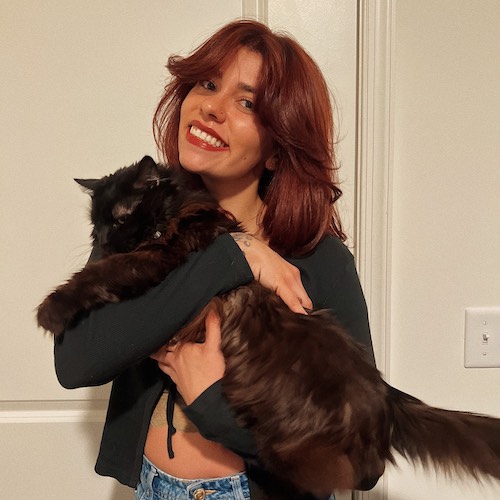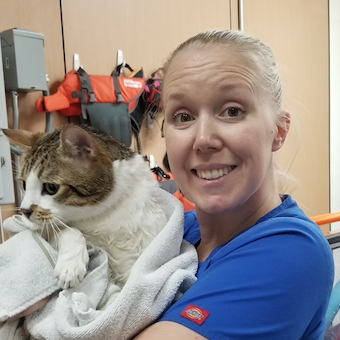The National Association of Veterinary Technicians in America (NAVTA) currently recognizes 16 Veterinary Technician Specialties (VTS).
How do you become a Veterinary Technician Specialist (VTS)?
In order to start your journey in achieving a certification first you need to apply to a NAVTA approved speciality academy. You will need to have your technician license, significant experience in the speciality, case logs and reports and some good old continuing education in order to be considered eligible for the certification exam.
Also, fun fact: that the VTS credential is most common in the United States!
So, let’s introduce you to the world of VTS!
The 16 Different Types of Veterinary Technician Specialists:
1. Clinical Pathology
The Academy of Veterinary Clinical Pathology Technicians (AVPCT) was established to promote and enhance a veterinary technician's knowledge of veterinary clinical pathology.
Earning a VTS in clinical pathology will demonstrate that the technician has superior knowledge and ability to perform laboratory techniques in comparison to a general veterinary technician.
To become a candidate for the certification you must have:
- at least 3 years of experience in the field
- a year-long case log
- a skill log
- 5 case reports
- 2 letters of recommendation!
Interested in learning more about AVPCT?
https://www.avcpt.net/about-us.html
2. Clinical Practice
The Academy of Veterinary Technicians in Clinical Practice (AVTCP) is modeled after the American Board of Veterinary Practitioners.
The academy has three species-specific categories:
- small animal
- exotic companion animal
- production animal
A VTS from this academy will be able to provide the highest standard of comprehensive and multidisciplinary care.
In order to earn a VTS in clinical practice, the candidate must have:
- at least 5 years of clinical experience
- 50 case logs
- 4 case reports
- 40 hours of continuing education
Interested in learning more about AVTCP?
3. Emergency and Critical Care
The Academy of Veterinary Emergency and Critical Care Technicians (AVECCT) ensures the certified technicians possess the knowledge and experience needed to work effectively in an emergency or critical care setting.
The AVECCT is also the first organization to become recognized by the NAVTA. To become certified the candidate must have:
- at least 3 years of experience
- a year-long case with at least 50 cases
- 4 in-depth case reports
- 25 hours of continuing education!
Interested in learning more about AVECCT?
4. Equine
The Academy of Equine Veterinary Nursing Technicians (AEVNT) advances the education and professional recognition of credentialed equine veterinary technicians who display excellence in, and dedication to providing quality and superior nursing care to equine patients.
In order to apply for the VTS you will need:
- a letter of intent
- a minimum of 4 years of work experience
- completion of the advanced skills form
- a year-long case log
- 5 detailed case reports
- 2 letters of recommendation
- at least 50 continuing education hours
Interested in learning more about AEVNT?
5. Internal Medicine
The Academy of Internal Medicine Veterinary Technicians (AIMVT) promotes the interest in and advance the skill of veterinary technicians within the disciplines of veterinary internal medicine by providing cutting edge continuing education, working with veterinarians to advocate for superior patient care, providing client education and ensuring consumer protection.
VTS in this field also have sub-specialities and just to name a few they have: cardiology, equine, small animal, etc. To become a candidate you must have:
- at least 3 years of experience
- a case log of at least 50 patients
- 4 case reports
- 40 hours of continuing education
- a completed skills checklist
- 2 letters of recommendation
Interested in learning more about AIMVT?
6. Veterinary Behavior
The Academy of Veterinary Behavior Technicians (AVBT) will advance the skill of veterinary technicians within the discipline of animal behavior and furthers their recognition as critical components of the veterinary behavior team in creating, maintaining and strengthening the human-animal bond.
To become a candidate you will need:
- 3 years of experience
- a case log of 50 patients or one year of research experience
- 5 detailed case reports
- 40 hours of continuing education
- a completed skills checklist
- 2 letters of recommendation
Interested in learning more about AVBT?
7. Veterinary Surgical
The Academy of Veterinary Surgical Technicians (AVST) encourages technicians to enhance their education and training by pursuing a surgical specialty.
Veterinary surgical techs are specially trained to assist veterinarians with surgical procedures and oversee pre-operative and post-operative care.
To become a candidate you must have:
- at least 3 years of experience with at least 75% of that time dedicated to performing veterinary surgical duties
- a letter of intent
- a case log of at least 50 patients
- 4 case reports
- 40 hours of continuing education
- 2 letters of recommendation
Interested in learning more about AVST?
8. Anesthesia and Analgesia
The Academy of Veterinary Technicians in Anesthesia and Analgesia (AVTAA) promotes patient safety, consumer protection, professionalism and excellence in anesthesia care and pain management.
After earning this VTS the technician will be able to provide your pet with exceptional care before, during and after a procedure. To become a candidate you will need:
- 4 years of experience
- 75% of those hours devoted to anesthesia
- up to 50 case logs
- 40 hours of continuing education
- 4 case reports
- a completed skills checklist
- 2 letters of recommendation
Interested in learning more about AVTAA?
https://www.avtaa-vts.org/index.pml
9. Veterinary Dental
The Academy of Veterinary Dental Technician (AVDT) gives technicians the opportunity to expand their knowledge and their professional value by becoming a specialist in the field of animal dentistry.
To become a candidate you must have:
- at least 3 years of experience with 50% of the time in dentistry
- case logs and reports
- continuing education hours
- a VTS mentor who will be able to provide more specifics in earning the credential after the application is approved
Interested in learning more about AVDT?
10. Veterinary Nutrition
The Academy of Veterinary Nutrition Technicians (AVNT) supports technicians to assist with the nutritional management of animals. To become a candidate you will need:
- at least 3 years of experience in clinical or research based animal nutrition
- 40 hours of continuing education
- completed skill form
- 1-year case log
- 5 case reports
- 2 letters of recommendation.
Interested in learning more about AVNT?
11. Zoo Veterinary
The Academy of Veterinary zoological Medicine Technicians (AVZMT) offers the opportunity for zoo technicians to demonstrate excellence in the field.
To become a candidate you must have:
- at least 5 years of experience in zoological medicine
- 40 case logs
- 40 hours of continuing education
- complete skills checklist
- 5 case reports
- 2 professional letters of recommendation
Interested in learning more about AVZMT?
12. Laboratory Animal
The Academy of Laboratory Animal Veterinary Technicians and Nurses (ALAVTN) promotes excellence in animal welfare and medical care for animals used in laboratory animal settings.
There are three certification categories: research clinical nursing with specific categories of “traditional” and “non-traditional”, research surgeon and research anesthetists.
To become a candidate you must have:
- at least 3 years of experience in laboratory animal practice with 70% of that time spent in applicable practice or one of the 3 certification categories
- 60 hours of continuing education
- 50 case logs
- completed advanced skills form
- 4 case reports
- 2 letters of recommendation
Interested in learning more about ALAVTN?
https://www.alavtn.org/index.html
13. Veterinary Ophthalmic
The Academy of Veterinary Ophthalmic Technicians (AVOT) advocates ocular health while advancing the knowledge and practice standards in the field of ophthalmology.
To become a candidate you must have:
- 3 years with 75% of the time spent in ophthalmology
- 40 hours of continuing education
- completed advanced ophthalmology skills list
- 4 case reports
- 50 case logs
- submit 3 questions for possible use in future examinations
- 2 letters of recommendation
Interested in learning more about AVOT?
14. Veterinary Dermatology
The Academy of Dermatology Veterinary Technicians (ADVT) promotes excellence through specialization in the discipline of veterinary dermatology by demonstrating an advanced proficiency of dermatologic procedures, working with the veterinary term and client to advocate superior patient care and providing cutting-edge continuing education.
The journey to become a VTS in dermatology is coming soon to their website to give you better information on how to get started so stay tuned!
Interested in learning more about ADVT?
15. Physical Rehabilitation
The Academy of Physical Rehabilitation Veterinary Technicians (APRVT) provides assistance in veterinary physical rehabilitation, encouraging veterinary professionals and colleagues to further their education, while improving the quality of animals’ lives.
To become a candidate you will need:
- 5 years of experience with 2 years of experience in general practice setting
- 4 case reports
- case logs and completed advanced skills list in veterinary physical rehabilitation
- letter of intent
- 2 letters of recommendation
Interested in learning more about APRVT?
16. Diagnostic Imaging
The Academy of Veterinary Technicians in Diagnostic Imaging (AVTDI) is composed of technicians dedicated to performing a higher level of veterinary diagnostic imaging modalities such as: digital radiographs, fluoroscopic special procedure, CT scan, MRI, ultrasound and nuclear medicine imaging.
To become a candidate you will need:
- 5 years of work experience with 75% of that experience dedicated in the field of diagnostic imaging or research based
- continuing education
- 2 letters of recommendation
- completion of the veterinary diagnostic imaging skills form
- 1 year of case logs
- 6 case reports
- submit 5 examination questions with corresponding answers for potential future use
Interested in learning more about AVTDI?
You’ve got this!
Be sure to review the organization websites as they are updated annually and good luck to all you future VTS candidates!




.gif)


